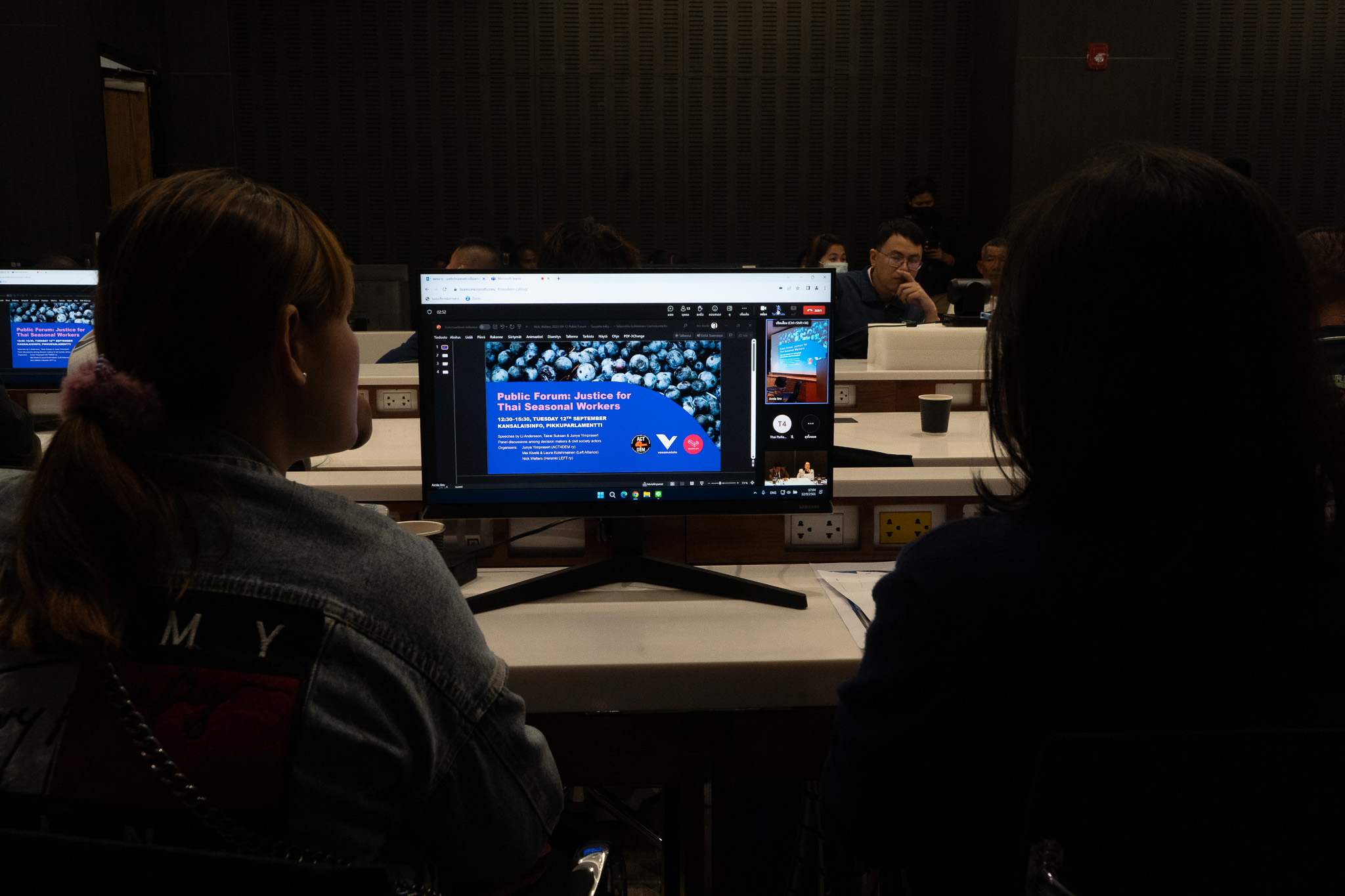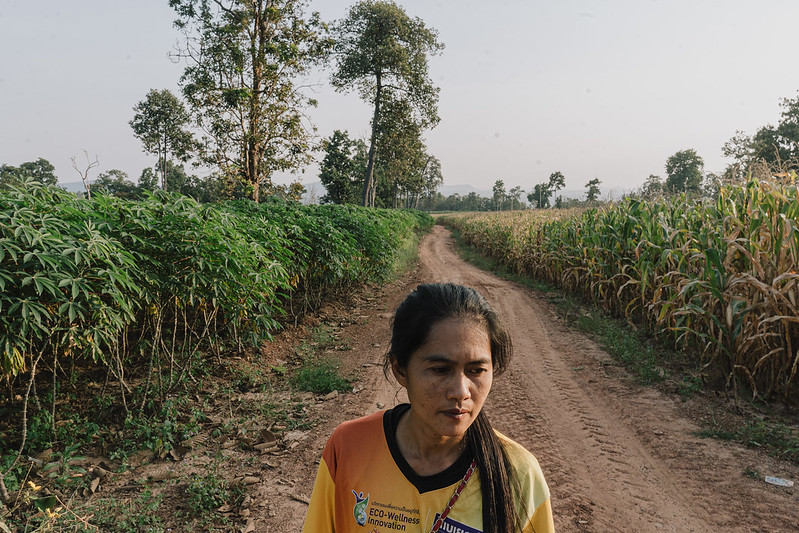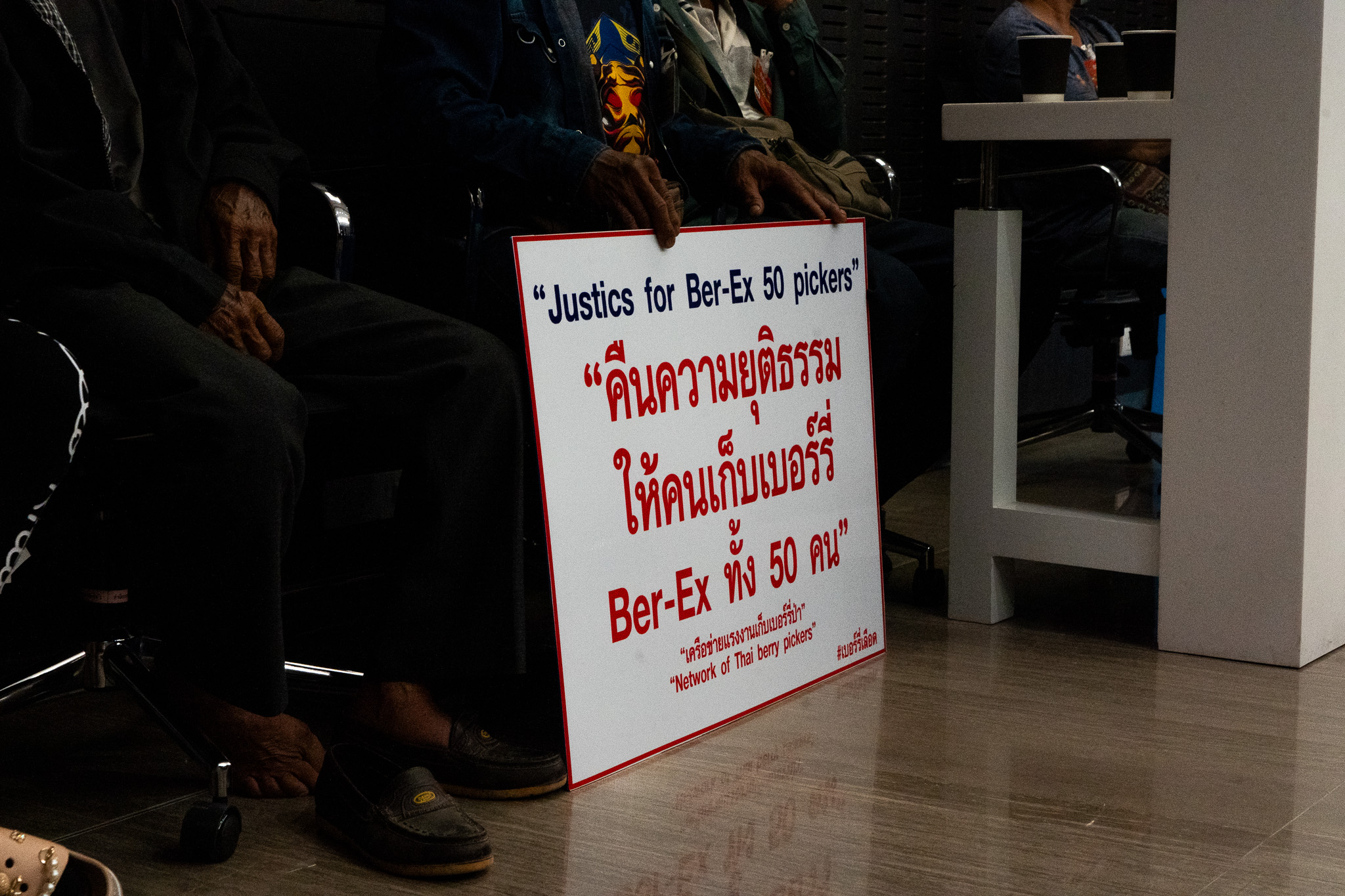In Part III of our four-part story on berry pickers in Finland, Jenpreeya and her husband return to Thailand after 70 fruitless days in Finland. Their work did not only not earn them a single euro, it actually left them owing the company money. They wonder if they had in fact been part of a human trafficking scheme. Disappointed and angry, Jenpreeya and other workers seek redress for the wrong done to them at a local government agency, then the Ministry of Labor and the Finnish Embassy in Bangkok. The issue enters the national stage in Parliament. In the end, will they find justice?
Jenpreeya and her husband weren’t the only ones to face the devastating situation of having worked for 70 days in a foreign land and returning home absolutely empty-handed.
Jenpreeya says that over 100 Thai workers were going through the same thing, including her sister-in-law and brother-in-law. Some of these workers returned to Thailand so broke that they had to raise donations among the group to make it back home.
Before they had gone to Finland, the Department of Employment announced the policy for the 2022 season of berry picking in Finland, requiring companies buying the fruit in Finland or their Thai agents to guarantee the wages for workers after deductions. The companies had to make a bank guarantee as determined by the department with the Bank for Agriculture and Agricultural Cooperatives. By the end of 2022, those companies would have to ensure that their contracted workers were to be paid at least 30,240 baht each ($848).
So Jenpreeya and her compatriots had some hope that she would still get some money out of it. During the orientation day before traveling, the local employment office in Nong Bua Lamphu told them to come to them if anyone encountered any problem.
“The employment office of Nong Bua Lamphu said it themselves,” Jenpreeya says. They had said “Come see me if there’s any issue. If you go and don’t get paid, come to me. If you get less than 30,000 baht, come see me right away, here.”
The words had made an impression on her. The official had “said it just like that and we trusted him. After we came back from Finland, we rushed to see him.”
But when they went there, they were surprised. The official seemed to change his tune. She says, “He said, ‘You were the one making the contacts. You went by yourself. You signed the documents, and none of you can speak any English.”
Jenpreeya was taken aback. “I never thought he’d say things like that,” she says.
She concedes that what he said was partly true, but also asks if that was the case, “How could you [the official] then think that these people will be able to travel by themselves, make the contacts, and apply for a visa by themselves, knowing they couldn’t speak English?”
Jenpreeya says the way the local official was portraying events made it seem like they, the workers who had been exploited, were the ones in the wrong.
To make matters worse, Jenpreeya’s letter of complaint to the office led to no relief. The formal reply says her case was not covered by its wage protection policy. The letter goes on to say she had made her work contract through an arrangement with the Thai embassy at Helsinki, meaning she had voluntarily agreed to the contract that promised her a nine-euro wage per hour ($9.69/346 baht), and that she would work eight hours a day for 40 hours a week.
The letter concludes by saying as the arrangement was not made by the Department of Employment, the office therefore could not give her the guaranteed wage as promised in its policy.
Legal battles and negotiations
With no relief from the employment office, Jenpreeya and 53 other workers raised funds among themselves to travel to Bangkok to petition the Ministry of Labor.
The response of the ministry gave them some hope.
The ministry insisted that “the company must take care of them,” she says, that “it must take responsibility.” She says the ministry said it was the company that “had put the workers out there to work, so it must take care of them.”
In April 2023, the company did in fact reach out to the aggrieved group of workers. It said it would pay a range of compensation from 10,000-20,000 baht ($280-$560), on the condition that the workers dropped their case with the ministry. But the group rejected the offer, saying they must receive at least 30,000 baht ($841) per person.
Negotiations resulted in the company agreeing to pay them 30,000-40,000 baht each ($841-$1,121), Jenpreeya says. But then some of the 53 workers received only 20,000 baht ($560). The company said their names were not included in the list.
“We sent all the names to the ministry, with national IDs and passports,” Jenpreeya says, “but they claimed the names were missing.” She asks, “How could they have been missing since I was the one submitting the names? How could they be missing?”
The company, she says, said it “had no idea” and that it used the list of names they had received from the ministry. In frustration, Jenpreeya had to ask again: Were the names missing or were they excluded.” The company maintained it got the list from the ministry.
The group decided to present a complaint to the Finnish embassy in Bangkok. In response to the petition, a representative of the group at the embassy told Jenpreeya that the ambassador had said something to the effect, “I’m sorry. I’ll look into it. I’m sorry this happened in my country. I had no idea it was like this.”
Jenpreeya herself had agreed to take the compensation, in exchange for her dropping the case. But it did not keep her from thinking about her troubles and efforts for the months she had spent working in Finland. She ended up with compensation of a little over 10,000 baht a month–less than the minimum salary in Thailand.
She and her friends had spent 70 days in a row working. Even if she had worked under the contract arranged by the Thai embassy in Helsinki, she should have been paid nine euros a day for eight hours for 72 euros a day, totalling 5,040 euros ($5,417/193,800 baht). This is about how much she thought she would have gotten at a minimum before she left Thailand in the first place.
But of course she had worked just eight hours a day. For the first two weeks picking strawberries, she was paid only 50 euros a week. She should have received 72 euros a day. For the following 50 days, they worked ten or more hours a day. They should have received at least 18 more euros per day, which would have given them 100 more hours to be compensated, or 900 euros. They should have gotten about 6,000 euros ($6,448/230,709).
How could the workers end up earning nothing and even being in debt to the company?
For Jenpreeya, there was only one way to explain what had happened to them. It was not simply they had been inadequately compensated. Instead, she says, it “was human trafficking.”
A crisis of human trafficking in the wild berry business?
The Ministry of Social Development and Human Security defines human trafficking as an act of arranging, delivering, taking, and managing a person who is obtained—a victim —with a purpose of having the person making profit and/or cutting costs. A range of methods are used to control the victim, intimidating them into obeying orders and not fleeing, or preventing them from revealing the real circumstances in case they are found by officials. Besides using force, a victim could also be bound by unlawful debts.
Traffickers might also use legal tactics, or threatening to trigger a legal procedure to force a victim to stay. Quite often, victims of trafficking decide not to flee, or believe or are frightened into thinking they and their close contacts would be in danger should they refuse to work. They are at risk of being abused, physically, sexually, and mentally. They typically live in or work at places under deplorable conditions.
The problems facing berry pickers in Finland had been raised to the national level in February 2023. Charas Khumkainam, a lawmaker of the Move Forward Party, raised the issue facing workers like Jenpreeya in parliament, outlining that there are three kinds of contracts that workers are pressured into signing before flying to Finland.
Charas says, there is a contract that completely details working conditions, wages and other payments, and benefits. It also prevents employers from forcing workers to send another contract to void this initial fair work contract. This version of the contract is used in the visa application process with the Department of Employment and the embassy.
Then there is a second contract which is the one that workers actually receive. This content is similar to the first one, but the protection clause that prevents employers from forcing workers to sign another contract is excluded.
But then there is a third contract which Charas called a “slave contract.” This contract cancels the previous two contracts. Both parties have had to sign the contract of the Department of Employment, which does not reflect the true intention of both parties. Although they are required to sign the “official” contract to get approval,neither party has the intention of being bound by that contract.
Charas said the process of taking workers to Finland involves orientations and extravagant seminars that are organized in cooperation with the Department of Employment—a state agency. After those meetings, workers are made to sign those three contracts. He questioned how it would be possible that the office does not know about this practice.
Charas raised the question to then Labor Minister Suchat Chomklin, who led an envoy on a business trip to Sweden and Finland last year and visited Thai workers at Polarica, “one of Europe’s largest suppliers of frozen berries and fruits,” which was embroiled in a lawsuit after being accused of human trafficking.
“Did the Labor Minister really not know or was he pretending not to know?” asked Charas. “This case has a connection to a high ranking official in the Finnish Labor Ministry, who was accused of taking bribes from private companies in relation to a quota allocation of wild berry pickers.”
Labor Minister Suchat informed the public that more than 10,000 workers went to Sweden and Finland in 2022. About 200 workers in Finland and 300 in Sweden were facing problems. The government, he said, was working to solve the problems, adding that they were caused by those who were first-time pickers lacking experience. Ninety percent of workers, he added, still benefited from the work.
He said the allocation of workers to both countries came from requests from their embassies and not on initiation of the Thai government. The embassies are also in charge of issuing visas and arranging for workers who wish to go there to pick berries.
The trip to Polarica was made because there were a lot of Thai workers there, Suchat said. He said it was a big, clearly established company. “It is by the main road,” he said. “It is a big company. They have been charged in their country and are still fighting the case. There is no conviction yet.”
Labor Minister Suchart left an impression that the current arrangement benefited Thais who went there to work. “I talked to people who had worked there every year for ten years,” he said. “They told me they come to work in June to August, which is the period when [the Thai workers] are waiting for rice to grow. They have free time then and they seek additional income. They told me they really earn 100,000 baht. They might work really hard or have their own techniques. A family of seven went there and earned 700,000-800,000 baht.”
For these reasons, he said, “the ministry supports workers to go. We do not support human trafficking. For those who experience problems, the ministry has been helping them and hundreds have already dropped their cases.”
Look forward to the conclusion of this in story in Part IV on December 16, 2023
Note: This work is supported by the AspirE project of the European Union (EU)





